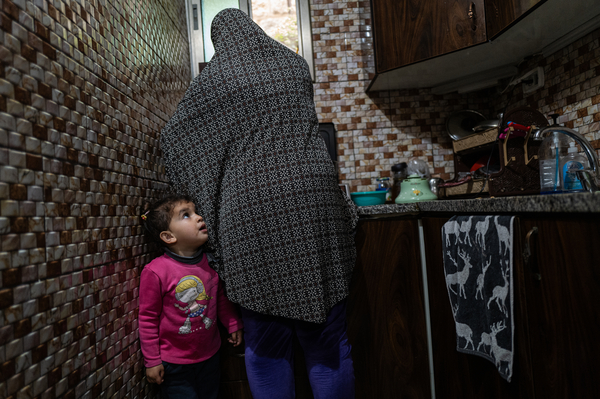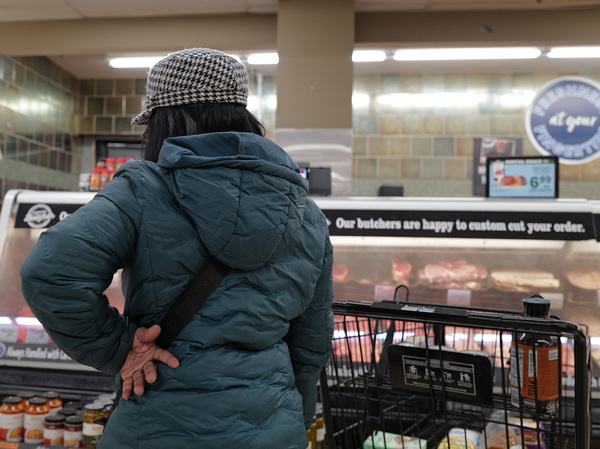
Why beating inflation is turning out to be as hard as losing weight
April 10, 2024
Minnesota lawmakers debate tighter rules for tech companies over content that could harm kids
April 10, 2024On a cloudy Sunday in late March, Amani Zeita busied herself in the kitchen, preparing a meal for her family of six to break fast at sundown, still a few hours away.
Her youngest, Sally Zeita, 3, hovered by her legs as Amani cut up meat, washed dishes and pulled ingredients from the kitchen pantry.
That pantry is looking a little more bare these days. It has Amani and her mother-in-law, Rahmeh Zeita, concerned.
“We only buy basic food: oil, rice, sugar,” Amani said through a translator. “Before, we would buy one kilo of meat. Now, we buy half a kilo of meat.”
It was the middle of the Muslim holy month of Ramadan when NPR visited Amani at her home in Ein ‘Arik, a village in the West Bank that’s about 4 miles west of Ramallah.
This holiday is usually a happy time shared with community. But it has been more solemn this year for so many reasons, Amani and Rahmeh said.
The Zeitas, like many other families in their community, are trying to cut back on spending. As with most men and women in the West Bank, Amani’s husband, Mousa Zeita, lost his job after Oct. 7.
“Everybody is having difficulty now more than any other time. Everybody is rationing. Everybody is doing less,” Amani said.
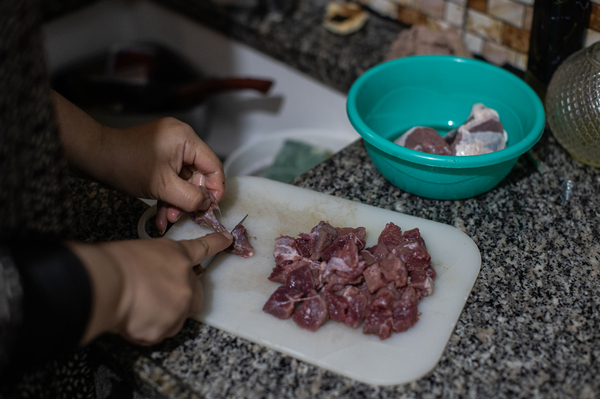
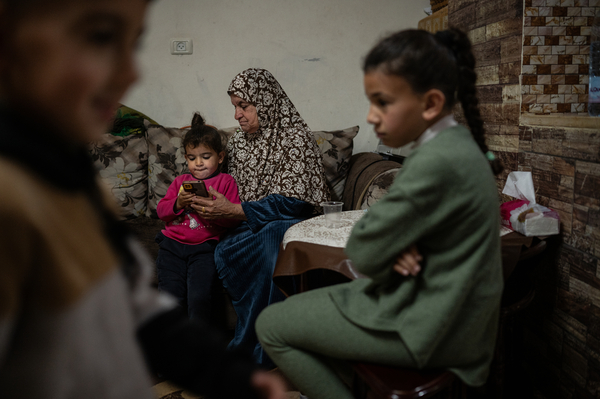
Ramadan also usually means parties with families and friends. Now? “No parties. No one is inviting anyone.”
Six months ago, Hamas-backed militants attacked Israel on Oct. 7, killing more than 1,200 people and taking 240 hostages, according to Israeli authorities. That triggered the latest war between Israel and Hamas in Gaza, where more than 30,000 people in Gaza have died from Israel’s military response.
Before Oct. 7, more than 110,000 Palestinians held permits to work in Israel or Israeli settlements, according to Palestinian officials. Israel suspended those work permits for most of those Palestinian laborers, like Mousa.
His four brothers lost their jobs, too.
Mousa’s brother, Issa Zeita, worked as a painter and plasterer in Israel.
Issa told NPR that he is depressed, that he sleeps all day and is worried about the future for his two young children.
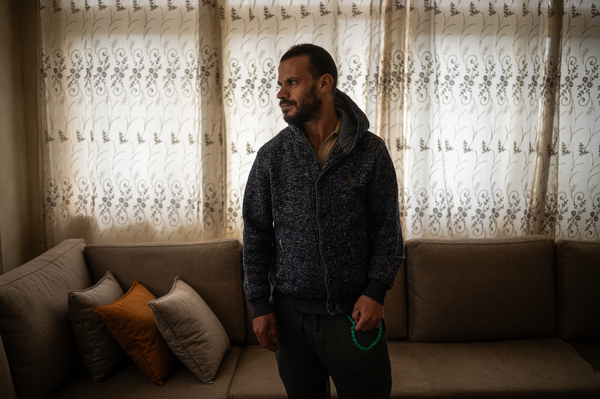
He said his friends, also unemployed, feel the same way.
“All of us are demoralized. We don’t know how to get out of this situation,” he said through a translator. “We’re dying every single day. Six months without work. I’m dying.”
That’s the case for the nearly 700,000 other unemployed Palestinians in Gaza and the West Bank, according to Azmi Abdel Rahman, the director of policy with the Palestinian Authority’s Ministry of Labor. The Palestinian Authority currently governs about 40 percent of the Israeli-occupied West Bank.
The International Labor Organization, a U.N. agency focused on improving labor standards around the world, estimated last month that some 507,000 jobs have been lost in the West Bank and Gaza as of the end of January.
Abdel Rahman said that doesn’t even capture the full picture.
“Prior to the war, we had issues with labor. We were not able to provide labor to our workers, to our people,’ Abdel Rahman said. “And now with the war and all these people unemployed, the situation has escalated and has become absolutely disastrous.”
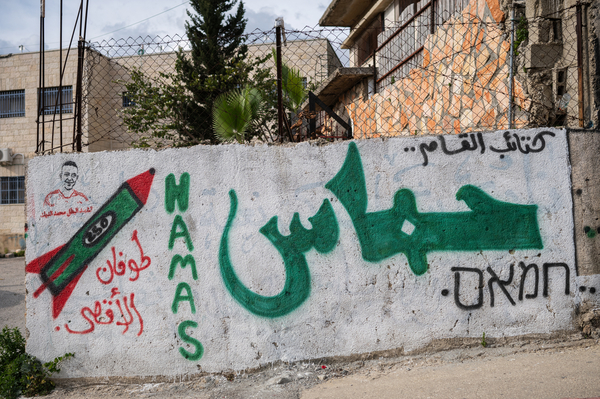
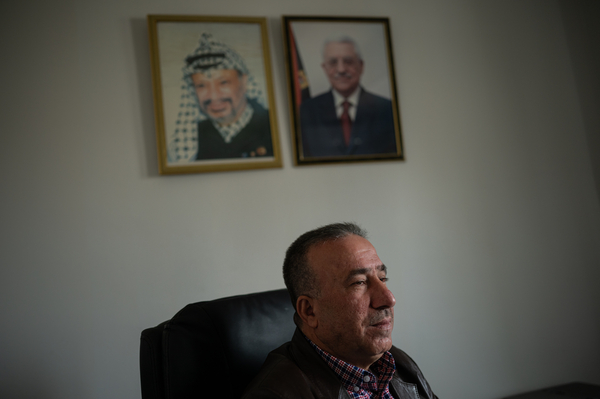
The International Labor Organization said in its report last month that if the war continues through the end of June 2024, the annual unemployment rate for the Occupied Palestinian Territory, which includes Gaza and the West Bank, is projected to rise to close to 46 percent.
“In addition to the devastating and catastrophic loss of life and with the people of Gaza on the brink of mass starvation, the war in Gaza has also caused an economic and social crisis that is unprecedented in the Occupied Palestinian Territory,” ILO Regional Director for Arab States Ruba Jaradat said in a statement in March.
‘I’ve never been in such a situation’
The Zeitas said they are still able to eat until they are full, but they are spending a lot more money to do so.
“The prices of food are very expensive. Vegetables are expensive,” Rahmeh Zeita said. “Before we used to buy vegetables in cases.” Now, they buy a much smaller amount. When the family usually might have purchased some store-made food items for Ramadan, they are making them by hand instead, she said.
She continued, “I’m 69 years old and I’ve never been in such a situation. Before we had less money, but you could buy so much with less money.”
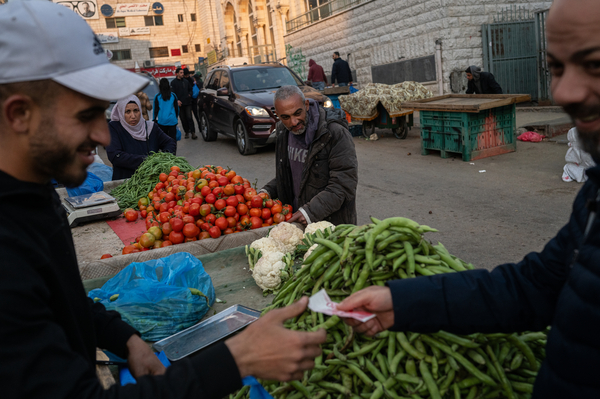
The bigger picture for the West Bank and Gaza is even darker, according to Abdel Rahman and the ILO.
The International Labour Organization said the estimated job losses translate to daily labor income losses of $21.7 million. That increases to $25.5 million per day when factoring in the reduced incomes of workers in both the private and public sectors. For example, Palestinian civil servants — those working in the government — are getting 60 percent of their salaries. Abdel Rahman is one of them.
“The situation in the Palestinian markets is disastrous,” he said.
The government cannot provide for the roughly 700,000 unemployed, he said.
“If the situation continues as it is and the war continues, then we will be facing not only an economic, not only a social, but also a security situation, a stability situation, a safety situation that will develop into the impossibility of peace in this area — which will not only impact the Palestinian Arabs but also Israel,” Abdel Rahman said.
‘The seventh of October has been a turning point in all aspects’
In the village of Kafr Ni’ma, about four miles northwest from the Zeita home in Ein ‘Arik, Marwan Ataya says his community is facing serious threats to its existence.
“The seventh of October has been a turning point in all aspects. Never in our life have we experienced this,” he said.
Just days before we visited his village in mid-March, armed Israeli settlers came into town and attacked a farm, killed sheep and burned a home and cars on March 15.
The rotting carcasses of the dead sheep were still inside the bed of one burned out truck when we visited the scene days after the attack.
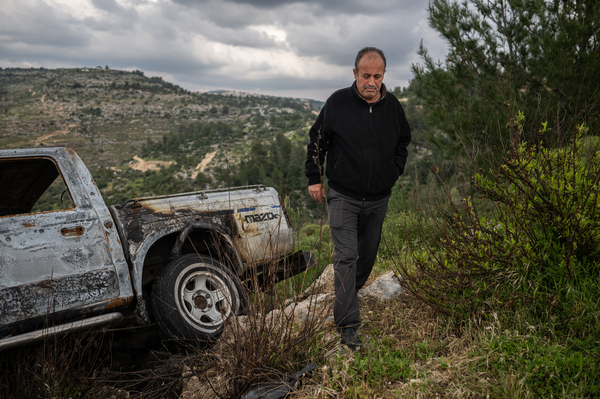
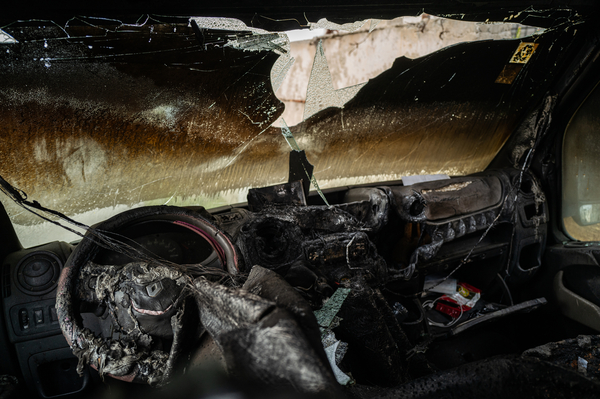
Ataya stood amid the charred remains of the home burned by the settlers. Luckily, the owner and his family were not home that day, said Ataya, who is a member of the village council.
On top of dealing with these kinds of threats from settlers, Kafr Ni’ma is facing a potentially disastrous economic situation.
About 40 percent of the 6,000 people who live in the village were workers inside Israel. All of them have been unemployed the last six months, Ataya said. Even the people who had worked in the West Bank are now jobless because there is no money coming in to keep them employed, he said.
“So the unemployment has risen, not only 40 percent as it is stated, but much more — almost 70 percent,’ Ataya claimed.
He’s concerned about what this means for the young men in particular, who are suddenly aimless.
Abdel Rahman, with the Ministry of Labor, agreed the social impact of unemployment is a major concern.
“It is very well known that unemployment produces all kinds of social problems. And one social problem that the Palestinian society is experiencing is inside the family,” he said. “There are a lot of problems inside the family because the breadwinner is unemployed.”
The young people “want to be employed, they want to have a future. Unfortunately, this is not happening,” he continued.
Many Palestinians in the West Bank have no faith that their government, the Palestinian Authority, will do anything concrete to address this crisis, both Ataya and Amani Zeita said.
“The Palestinian Authority suffered before the war from lack of credibility. [The government] is just a name and they can do nothing,” he said.
Abdel Rahman said himself the Palestinian Authority is unable to fix the situation on its own.
“It needs resources, it needs funding,” he said. For that, the PA is turning toward “donors” or other countries for aid.
The government has created a “very detailed plan” to donor countries, hoping to be able to fund a program that boosts the region's economy and helps its people, he said.
The ILO said it’s currently coordinating with other UN agencies to implement a “three-phase” relief program to support Palestinian working families and employers. Last November, it also launched an effort to raise $20 million to fund such a response plan, the agency said.
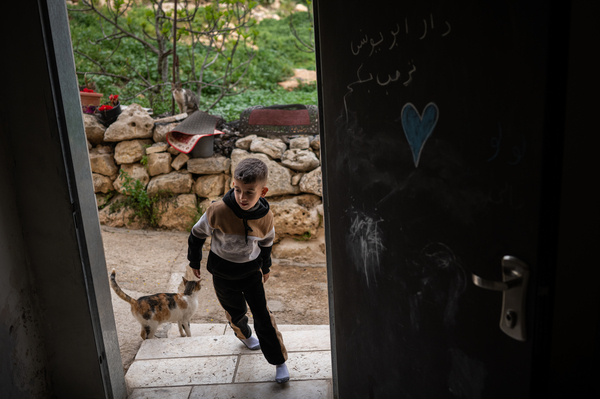
In the meantime, many Palestinians, who are terrified about their own safety and their family’s survival, are turning to themselves, their families, their communities and religion to get them through.
Both Ataya and the Zeitas said they’ve seen more people turn to religion as salvation.
Even Amani’s son 5-year-old son, Anas, told her one recent afternoon not to make him a sandwich as he decided to fast for Ramadan for the first time.
Ataya called it “an awakening.”
He said, “The only solution is to go to God.”
Nuha Musleh contributed to this report.
Copyright 2024 NPR. To see more, visit https://www.npr.org.



